Health Care Management Case Study: Lewin and ADKAR Change Models
VerifiedAdded on 2023/06/13
|14
|3984
|318
AI Summary
This case study analyzes the implementation of Lewin and ADKAR change models in healthcare management, specifically in the Mid Staffordshire General Hospitals NHS Trust. It discusses the major resistance from employees, including lack of management support, resistance from junior doctors, and resistance from staff. The study recommends the use of force field analysis to address the resistance and implement effective change.
Contribute Materials
Your contribution can guide someone’s learning journey. Share your
documents today.
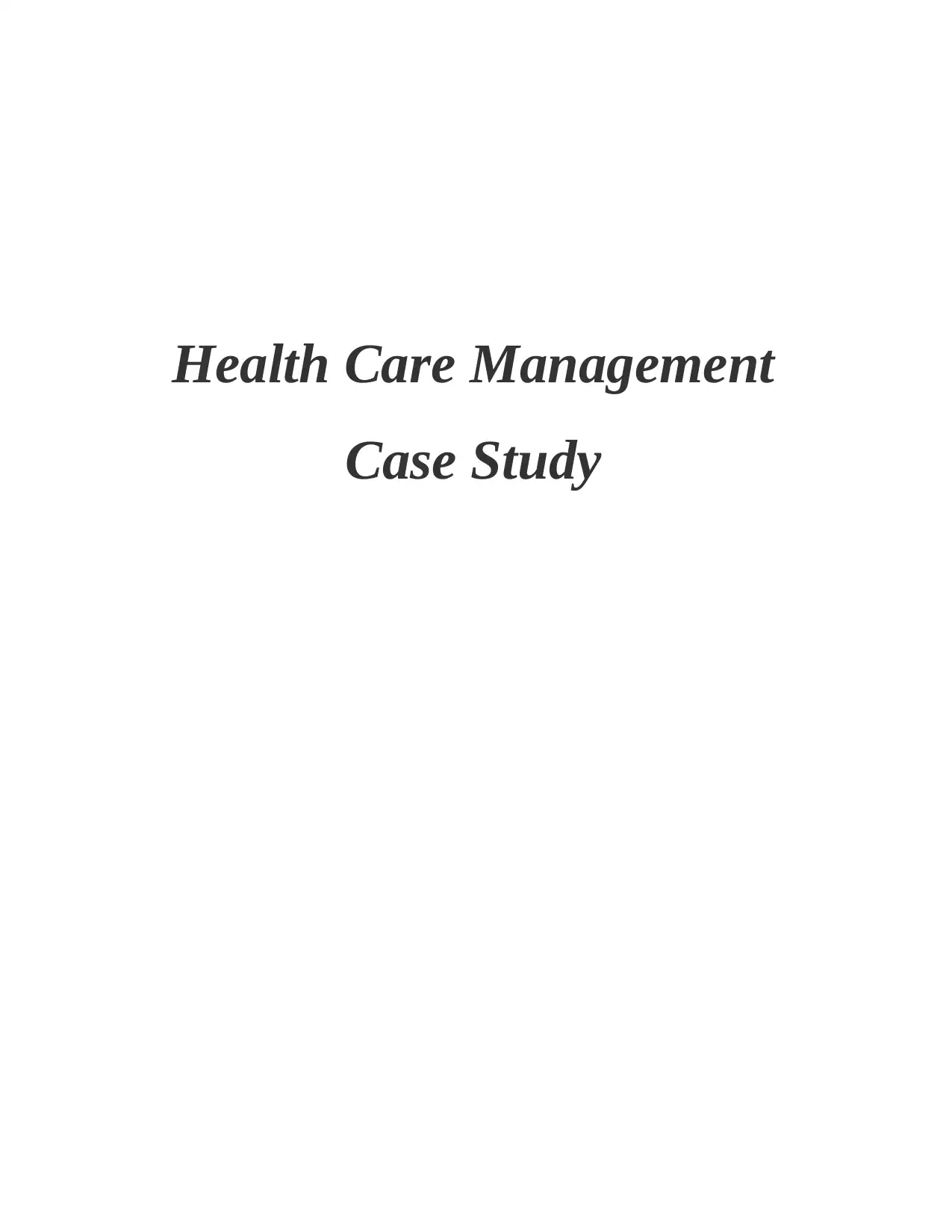
Health Care Management
Case Study
Case Study
Secure Best Marks with AI Grader
Need help grading? Try our AI Grader for instant feedback on your assignments.
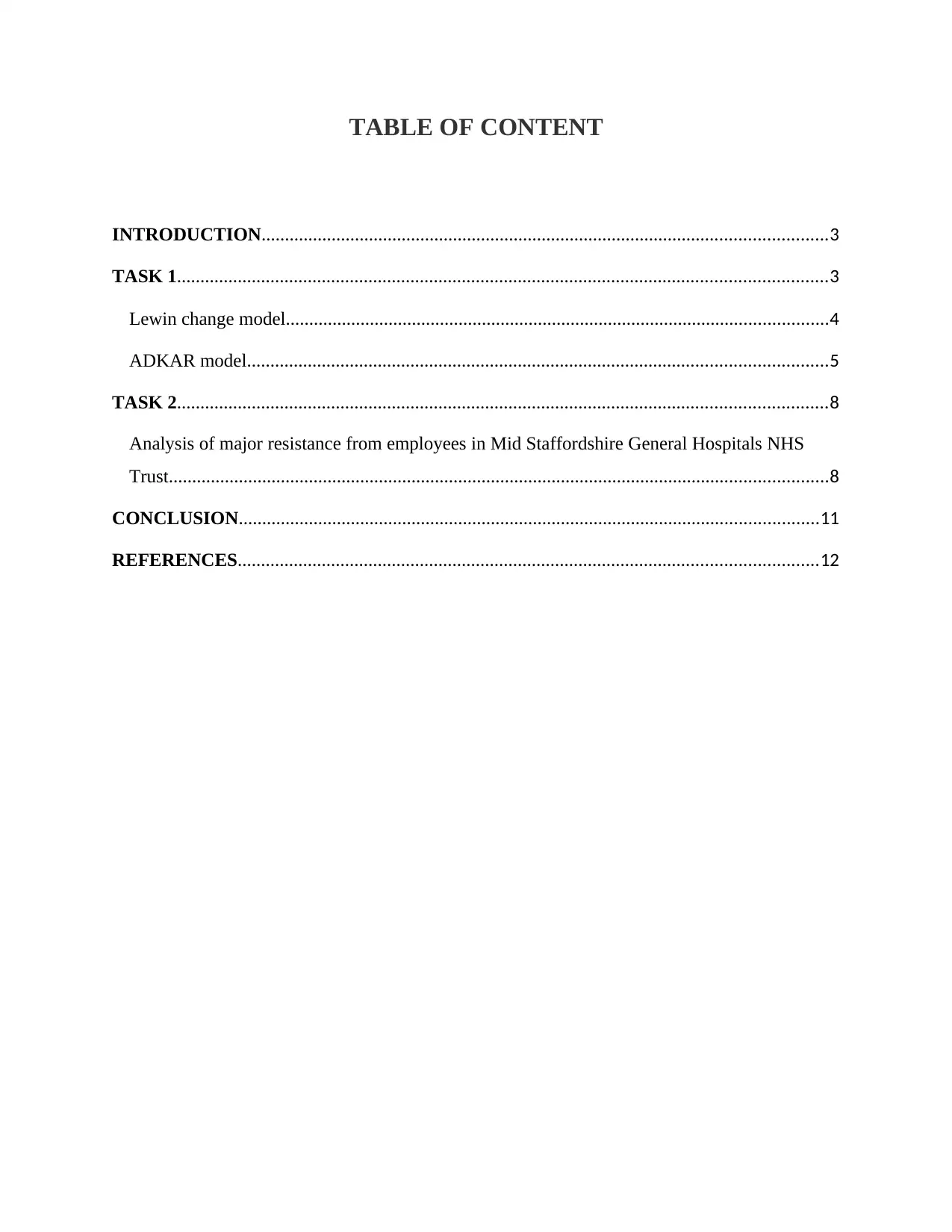
TABLE OF CONTENT
INTRODUCTION.........................................................................................................................3
TASK 1...........................................................................................................................................3
Lewin change model....................................................................................................................4
ADKAR model............................................................................................................................5
TASK 2...........................................................................................................................................8
Analysis of major resistance from employees in Mid Staffordshire General Hospitals NHS
Trust.............................................................................................................................................8
CONCLUSION............................................................................................................................11
REFERENCES............................................................................................................................12
INTRODUCTION.........................................................................................................................3
TASK 1...........................................................................................................................................3
Lewin change model....................................................................................................................4
ADKAR model............................................................................................................................5
TASK 2...........................................................................................................................................8
Analysis of major resistance from employees in Mid Staffordshire General Hospitals NHS
Trust.............................................................................................................................................8
CONCLUSION............................................................................................................................11
REFERENCES............................................................................................................................12
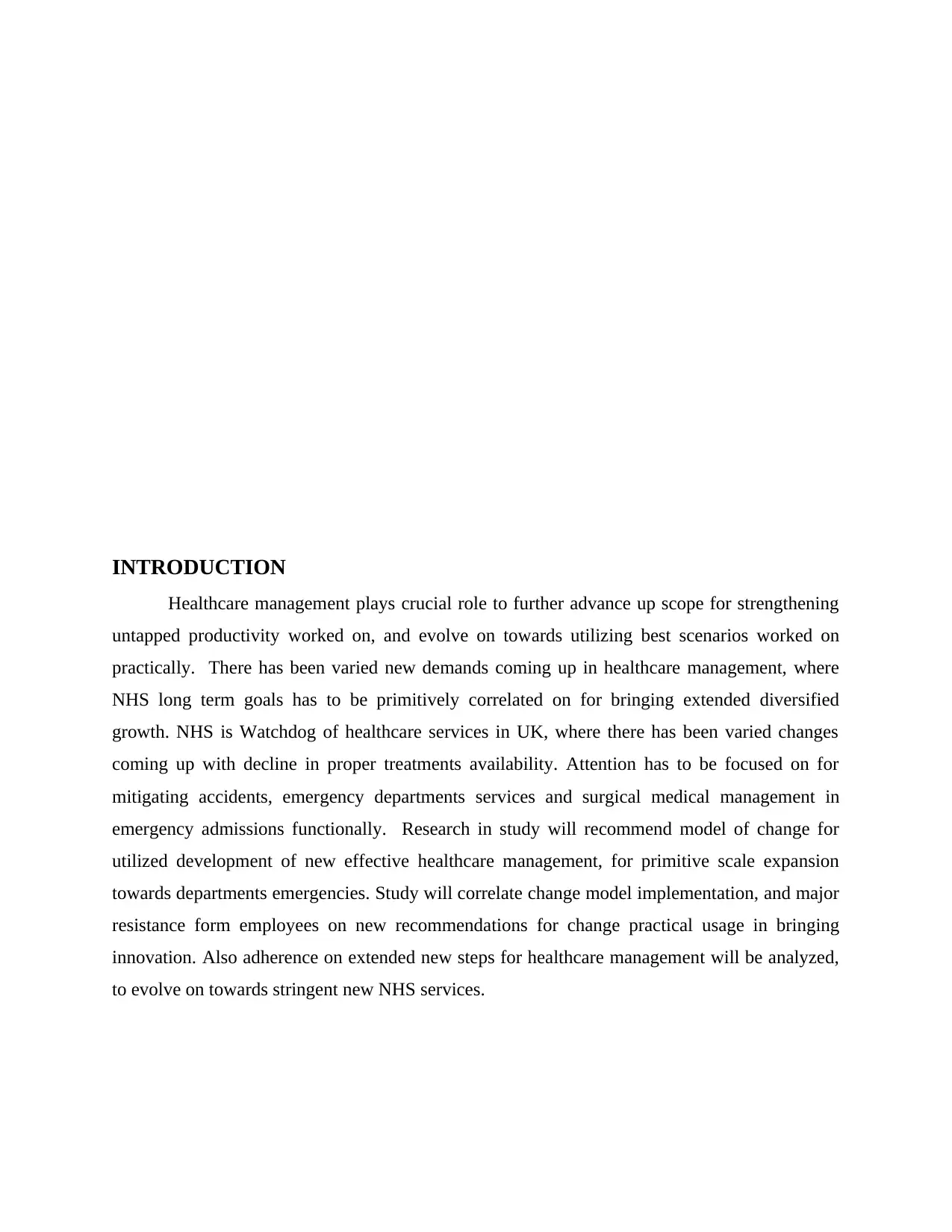
INTRODUCTION
Healthcare management plays crucial role to further advance up scope for strengthening
untapped productivity worked on, and evolve on towards utilizing best scenarios worked on
practically. There has been varied new demands coming up in healthcare management, where
NHS long term goals has to be primitively correlated on for bringing extended diversified
growth. NHS is Watchdog of healthcare services in UK, where there has been varied changes
coming up with decline in proper treatments availability. Attention has to be focused on for
mitigating accidents, emergency departments services and surgical medical management in
emergency admissions functionally. Research in study will recommend model of change for
utilized development of new effective healthcare management, for primitive scale expansion
towards departments emergencies. Study will correlate change model implementation, and major
resistance form employees on new recommendations for change practical usage in bringing
innovation. Also adherence on extended new steps for healthcare management will be analyzed,
to evolve on towards stringent new NHS services.
Healthcare management plays crucial role to further advance up scope for strengthening
untapped productivity worked on, and evolve on towards utilizing best scenarios worked on
practically. There has been varied new demands coming up in healthcare management, where
NHS long term goals has to be primitively correlated on for bringing extended diversified
growth. NHS is Watchdog of healthcare services in UK, where there has been varied changes
coming up with decline in proper treatments availability. Attention has to be focused on for
mitigating accidents, emergency departments services and surgical medical management in
emergency admissions functionally. Research in study will recommend model of change for
utilized development of new effective healthcare management, for primitive scale expansion
towards departments emergencies. Study will correlate change model implementation, and major
resistance form employees on new recommendations for change practical usage in bringing
innovation. Also adherence on extended new steps for healthcare management will be analyzed,
to evolve on towards stringent new NHS services.
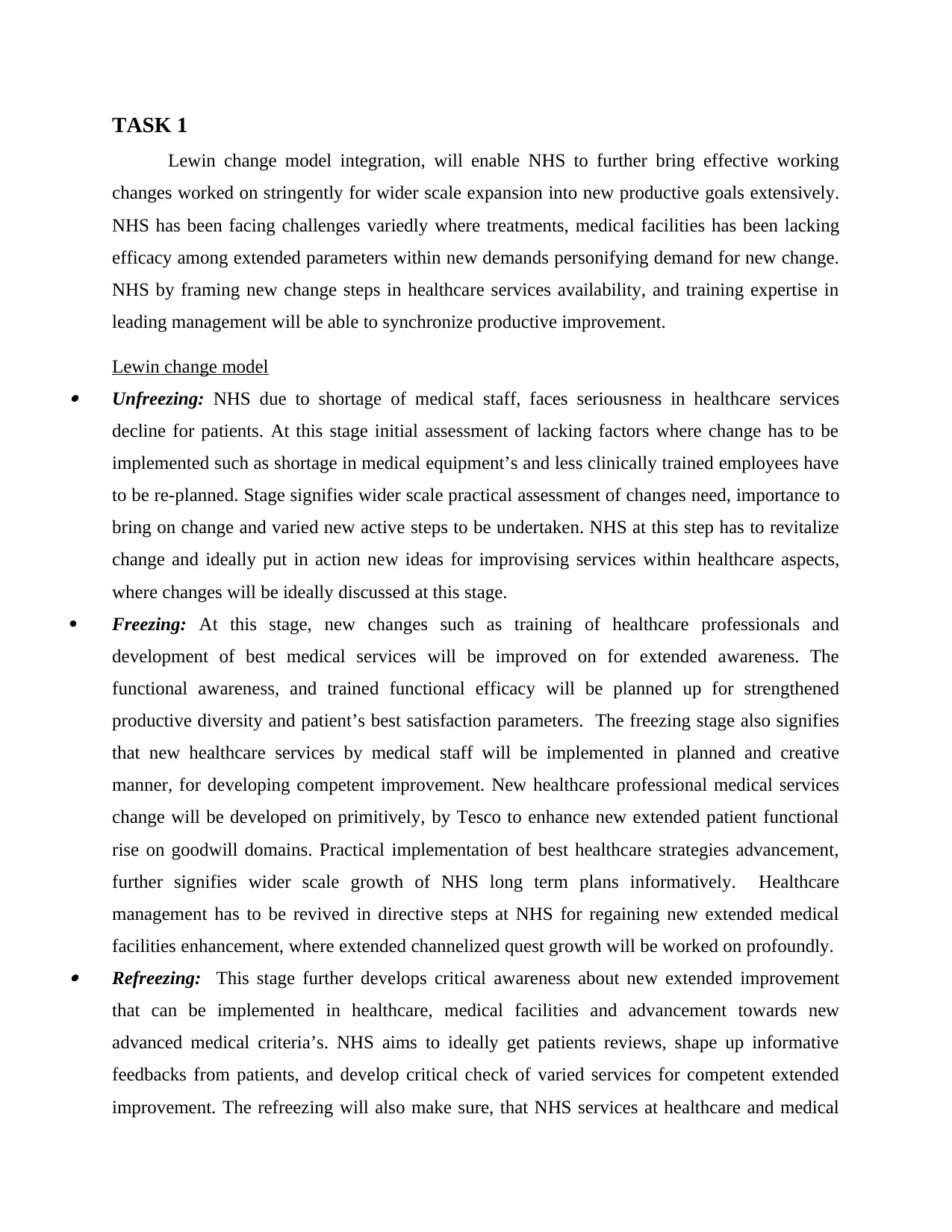
TASK 1
Lewin change model integration, will enable NHS to further bring effective working
changes worked on stringently for wider scale expansion into new productive goals extensively.
NHS has been facing challenges variedly where treatments, medical facilities has been lacking
efficacy among extended parameters within new demands personifying demand for new change.
NHS by framing new change steps in healthcare services availability, and training expertise in
leading management will be able to synchronize productive improvement.
Lewin change model
Unfreezing: NHS due to shortage of medical staff, faces seriousness in healthcare services
decline for patients. At this stage initial assessment of lacking factors where change has to be
implemented such as shortage in medical equipment’s and less clinically trained employees have
to be re-planned. Stage signifies wider scale practical assessment of changes need, importance to
bring on change and varied new active steps to be undertaken. NHS at this step has to revitalize
change and ideally put in action new ideas for improvising services within healthcare aspects,
where changes will be ideally discussed at this stage.
Freezing: At this stage, new changes such as training of healthcare professionals and
development of best medical services will be improved on for extended awareness. The
functional awareness, and trained functional efficacy will be planned up for strengthened
productive diversity and patient’s best satisfaction parameters. The freezing stage also signifies
that new healthcare services by medical staff will be implemented in planned and creative
manner, for developing competent improvement. New healthcare professional medical services
change will be developed on primitively, by Tesco to enhance new extended patient functional
rise on goodwill domains. Practical implementation of best healthcare strategies advancement,
further signifies wider scale growth of NHS long term plans informatively. Healthcare
management has to be revived in directive steps at NHS for regaining new extended medical
facilities enhancement, where extended channelized quest growth will be worked on profoundly.
Refreezing: This stage further develops critical awareness about new extended improvement
that can be implemented in healthcare, medical facilities and advancement towards new
advanced medical criteria’s. NHS aims to ideally get patients reviews, shape up informative
feedbacks from patients, and develop critical check of varied services for competent extended
improvement. The refreezing will also make sure, that NHS services at healthcare and medical
Lewin change model integration, will enable NHS to further bring effective working
changes worked on stringently for wider scale expansion into new productive goals extensively.
NHS has been facing challenges variedly where treatments, medical facilities has been lacking
efficacy among extended parameters within new demands personifying demand for new change.
NHS by framing new change steps in healthcare services availability, and training expertise in
leading management will be able to synchronize productive improvement.
Lewin change model
Unfreezing: NHS due to shortage of medical staff, faces seriousness in healthcare services
decline for patients. At this stage initial assessment of lacking factors where change has to be
implemented such as shortage in medical equipment’s and less clinically trained employees have
to be re-planned. Stage signifies wider scale practical assessment of changes need, importance to
bring on change and varied new active steps to be undertaken. NHS at this step has to revitalize
change and ideally put in action new ideas for improvising services within healthcare aspects,
where changes will be ideally discussed at this stage.
Freezing: At this stage, new changes such as training of healthcare professionals and
development of best medical services will be improved on for extended awareness. The
functional awareness, and trained functional efficacy will be planned up for strengthened
productive diversity and patient’s best satisfaction parameters. The freezing stage also signifies
that new healthcare services by medical staff will be implemented in planned and creative
manner, for developing competent improvement. New healthcare professional medical services
change will be developed on primitively, by Tesco to enhance new extended patient functional
rise on goodwill domains. Practical implementation of best healthcare strategies advancement,
further signifies wider scale growth of NHS long term plans informatively. Healthcare
management has to be revived in directive steps at NHS for regaining new extended medical
facilities enhancement, where extended channelized quest growth will be worked on profoundly.
Refreezing: This stage further develops critical awareness about new extended improvement
that can be implemented in healthcare, medical facilities and advancement towards new
advanced medical criteria’s. NHS aims to ideally get patients reviews, shape up informative
feedbacks from patients, and develop critical check of varied services for competent extended
improvement. The refreezing will also make sure, that NHS services at healthcare and medical
Secure Best Marks with AI Grader
Need help grading? Try our AI Grader for instant feedback on your assignments.
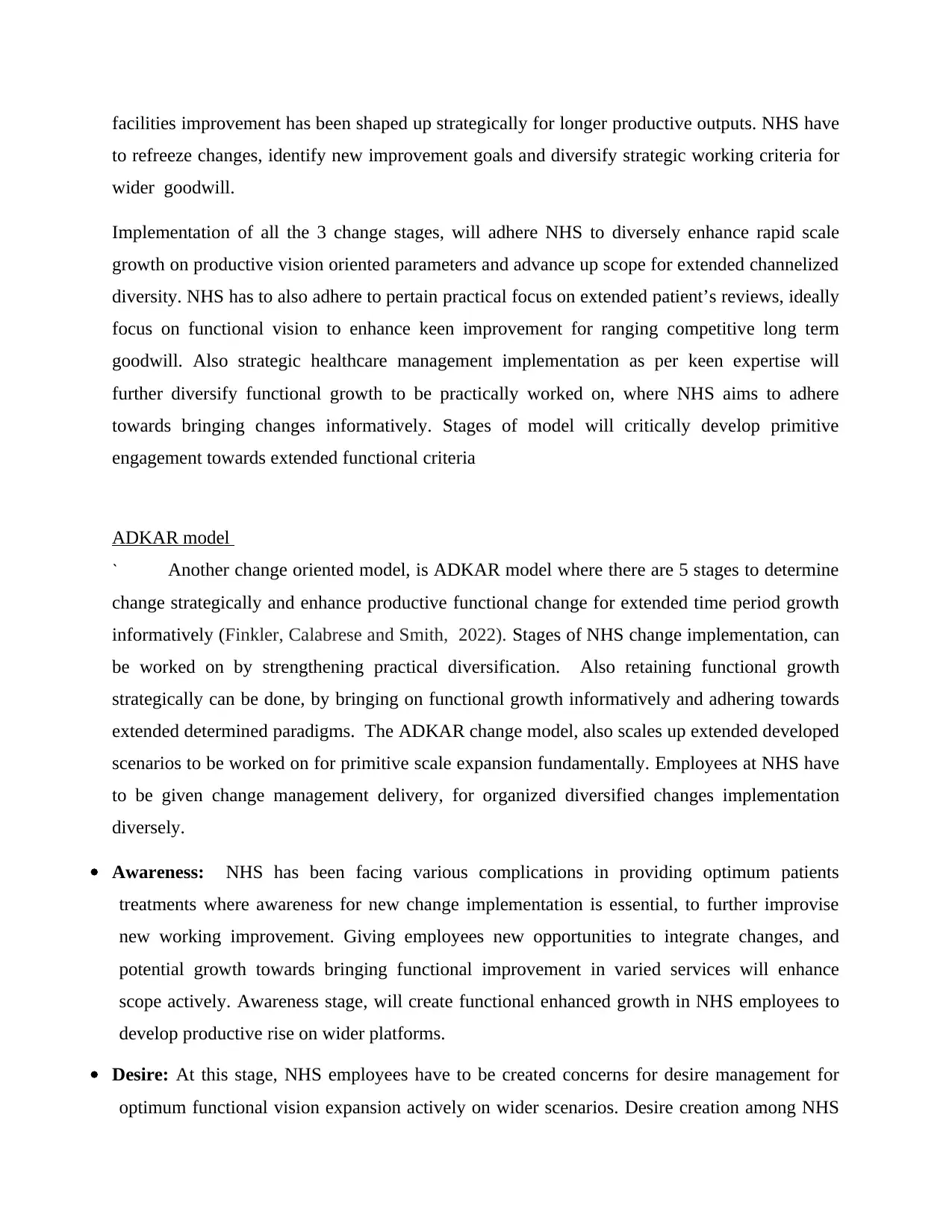
facilities improvement has been shaped up strategically for longer productive outputs. NHS have
to refreeze changes, identify new improvement goals and diversify strategic working criteria for
wider goodwill.
Implementation of all the 3 change stages, will adhere NHS to diversely enhance rapid scale
growth on productive vision oriented parameters and advance up scope for extended channelized
diversity. NHS has to also adhere to pertain practical focus on extended patient’s reviews, ideally
focus on functional vision to enhance keen improvement for ranging competitive long term
goodwill. Also strategic healthcare management implementation as per keen expertise will
further diversify functional growth to be practically worked on, where NHS aims to adhere
towards bringing changes informatively. Stages of model will critically develop primitive
engagement towards extended functional criteria
ADKAR model
` Another change oriented model, is ADKAR model where there are 5 stages to determine
change strategically and enhance productive functional change for extended time period growth
informatively (Finkler, Calabrese and Smith, 2022). Stages of NHS change implementation, can
be worked on by strengthening practical diversification. Also retaining functional growth
strategically can be done, by bringing on functional growth informatively and adhering towards
extended determined paradigms. The ADKAR change model, also scales up extended developed
scenarios to be worked on for primitive scale expansion fundamentally. Employees at NHS have
to be given change management delivery, for organized diversified changes implementation
diversely.
Awareness: NHS has been facing various complications in providing optimum patients
treatments where awareness for new change implementation is essential, to further improvise
new working improvement. Giving employees new opportunities to integrate changes, and
potential growth towards bringing functional improvement in varied services will enhance
scope actively. Awareness stage, will create functional enhanced growth in NHS employees to
develop productive rise on wider platforms.
Desire: At this stage, NHS employees have to be created concerns for desire management for
optimum functional vision expansion actively on wider scenarios. Desire creation among NHS
to refreeze changes, identify new improvement goals and diversify strategic working criteria for
wider goodwill.
Implementation of all the 3 change stages, will adhere NHS to diversely enhance rapid scale
growth on productive vision oriented parameters and advance up scope for extended channelized
diversity. NHS has to also adhere to pertain practical focus on extended patient’s reviews, ideally
focus on functional vision to enhance keen improvement for ranging competitive long term
goodwill. Also strategic healthcare management implementation as per keen expertise will
further diversify functional growth to be practically worked on, where NHS aims to adhere
towards bringing changes informatively. Stages of model will critically develop primitive
engagement towards extended functional criteria
ADKAR model
` Another change oriented model, is ADKAR model where there are 5 stages to determine
change strategically and enhance productive functional change for extended time period growth
informatively (Finkler, Calabrese and Smith, 2022). Stages of NHS change implementation, can
be worked on by strengthening practical diversification. Also retaining functional growth
strategically can be done, by bringing on functional growth informatively and adhering towards
extended determined paradigms. The ADKAR change model, also scales up extended developed
scenarios to be worked on for primitive scale expansion fundamentally. Employees at NHS have
to be given change management delivery, for organized diversified changes implementation
diversely.
Awareness: NHS has been facing various complications in providing optimum patients
treatments where awareness for new change implementation is essential, to further improvise
new working improvement. Giving employees new opportunities to integrate changes, and
potential growth towards bringing functional improvement in varied services will enhance
scope actively. Awareness stage, will create functional enhanced growth in NHS employees to
develop productive rise on wider platforms.
Desire: At this stage, NHS employees have to be created concerns for desire management for
optimum functional vision expansion actively on wider scenarios. Desire creation among NHS
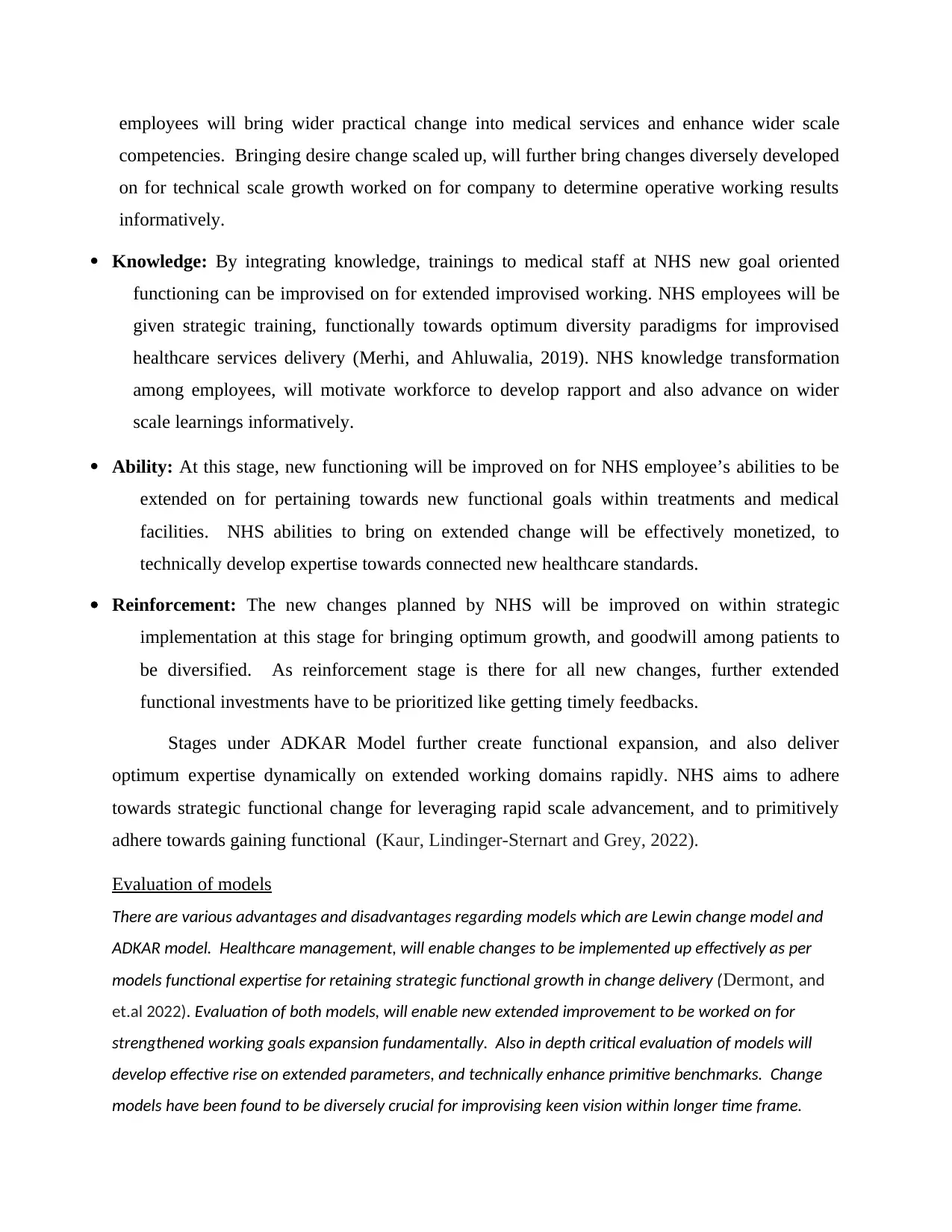
employees will bring wider practical change into medical services and enhance wider scale
competencies. Bringing desire change scaled up, will further bring changes diversely developed
on for technical scale growth worked on for company to determine operative working results
informatively.
Knowledge: By integrating knowledge, trainings to medical staff at NHS new goal oriented
functioning can be improvised on for extended improvised working. NHS employees will be
given strategic training, functionally towards optimum diversity paradigms for improvised
healthcare services delivery (Merhi, and Ahluwalia, 2019). NHS knowledge transformation
among employees, will motivate workforce to develop rapport and also advance on wider
scale learnings informatively.
Ability: At this stage, new functioning will be improved on for NHS employee’s abilities to be
extended on for pertaining towards new functional goals within treatments and medical
facilities. NHS abilities to bring on extended change will be effectively monetized, to
technically develop expertise towards connected new healthcare standards.
Reinforcement: The new changes planned by NHS will be improved on within strategic
implementation at this stage for bringing optimum growth, and goodwill among patients to
be diversified. As reinforcement stage is there for all new changes, further extended
functional investments have to be prioritized like getting timely feedbacks.
Stages under ADKAR Model further create functional expansion, and also deliver
optimum expertise dynamically on extended working domains rapidly. NHS aims to adhere
towards strategic functional change for leveraging rapid scale advancement, and to primitively
adhere towards gaining functional (Kaur, Lindinger-Sternart and Grey, 2022).
Evaluation of models
There are various advantages and disadvantages regarding models which are Lewin change model and
ADKAR model. Healthcare management, will enable changes to be implemented up effectively as per
models functional expertise for retaining strategic functional growth in change delivery (Dermont, and
et.al 2022). Evaluation of both models, will enable new extended improvement to be worked on for
strengthened working goals expansion fundamentally. Also in depth critical evaluation of models will
develop effective rise on extended parameters, and technically enhance primitive benchmarks. Change
models have been found to be diversely crucial for improvising keen vision within longer time frame.
competencies. Bringing desire change scaled up, will further bring changes diversely developed
on for technical scale growth worked on for company to determine operative working results
informatively.
Knowledge: By integrating knowledge, trainings to medical staff at NHS new goal oriented
functioning can be improvised on for extended improvised working. NHS employees will be
given strategic training, functionally towards optimum diversity paradigms for improvised
healthcare services delivery (Merhi, and Ahluwalia, 2019). NHS knowledge transformation
among employees, will motivate workforce to develop rapport and also advance on wider
scale learnings informatively.
Ability: At this stage, new functioning will be improved on for NHS employee’s abilities to be
extended on for pertaining towards new functional goals within treatments and medical
facilities. NHS abilities to bring on extended change will be effectively monetized, to
technically develop expertise towards connected new healthcare standards.
Reinforcement: The new changes planned by NHS will be improved on within strategic
implementation at this stage for bringing optimum growth, and goodwill among patients to
be diversified. As reinforcement stage is there for all new changes, further extended
functional investments have to be prioritized like getting timely feedbacks.
Stages under ADKAR Model further create functional expansion, and also deliver
optimum expertise dynamically on extended working domains rapidly. NHS aims to adhere
towards strategic functional change for leveraging rapid scale advancement, and to primitively
adhere towards gaining functional (Kaur, Lindinger-Sternart and Grey, 2022).
Evaluation of models
There are various advantages and disadvantages regarding models which are Lewin change model and
ADKAR model. Healthcare management, will enable changes to be implemented up effectively as per
models functional expertise for retaining strategic functional growth in change delivery (Dermont, and
et.al 2022). Evaluation of both models, will enable new extended improvement to be worked on for
strengthened working goals expansion fundamentally. Also in depth critical evaluation of models will
develop effective rise on extended parameters, and technically enhance primitive benchmarks. Change
models have been found to be diversely crucial for improvising keen vision within longer time frame.
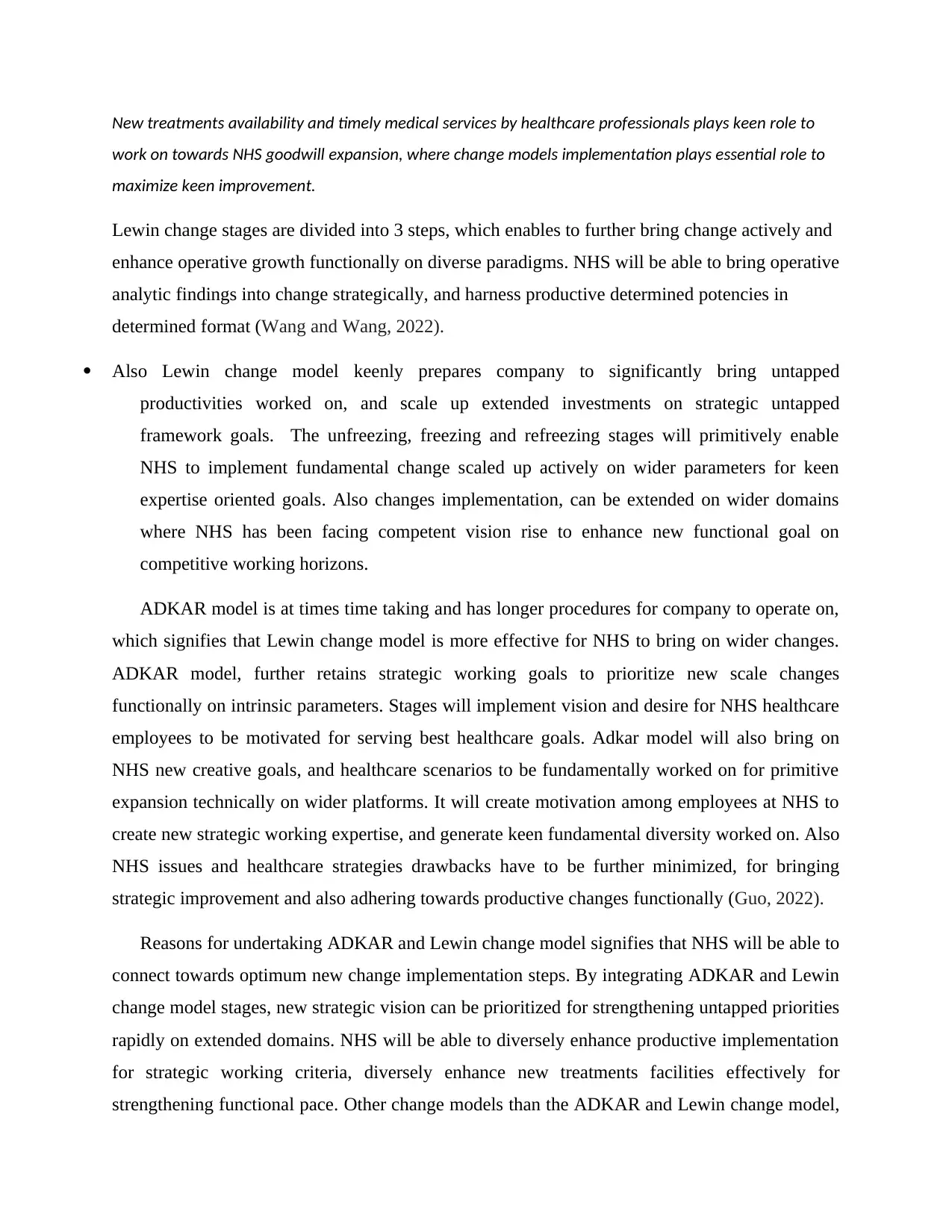
New treatments availability and timely medical services by healthcare professionals plays keen role to
work on towards NHS goodwill expansion, where change models implementation plays essential role to
maximize keen improvement.
Lewin change stages are divided into 3 steps, which enables to further bring change actively and
enhance operative growth functionally on diverse paradigms. NHS will be able to bring operative
analytic findings into change strategically, and harness productive determined potencies in
determined format (Wang and Wang, 2022).
Also Lewin change model keenly prepares company to significantly bring untapped
productivities worked on, and scale up extended investments on strategic untapped
framework goals. The unfreezing, freezing and refreezing stages will primitively enable
NHS to implement fundamental change scaled up actively on wider parameters for keen
expertise oriented goals. Also changes implementation, can be extended on wider domains
where NHS has been facing competent vision rise to enhance new functional goal on
competitive working horizons.
ADKAR model is at times time taking and has longer procedures for company to operate on,
which signifies that Lewin change model is more effective for NHS to bring on wider changes.
ADKAR model, further retains strategic working goals to prioritize new scale changes
functionally on intrinsic parameters. Stages will implement vision and desire for NHS healthcare
employees to be motivated for serving best healthcare goals. Adkar model will also bring on
NHS new creative goals, and healthcare scenarios to be fundamentally worked on for primitive
expansion technically on wider platforms. It will create motivation among employees at NHS to
create new strategic working expertise, and generate keen fundamental diversity worked on. Also
NHS issues and healthcare strategies drawbacks have to be further minimized, for bringing
strategic improvement and also adhering towards productive changes functionally (Guo, 2022).
Reasons for undertaking ADKAR and Lewin change model signifies that NHS will be able to
connect towards optimum new change implementation steps. By integrating ADKAR and Lewin
change model stages, new strategic vision can be prioritized for strengthening untapped priorities
rapidly on extended domains. NHS will be able to diversely enhance productive implementation
for strategic working criteria, diversely enhance new treatments facilities effectively for
strengthening functional pace. Other change models than the ADKAR and Lewin change model,
work on towards NHS goodwill expansion, where change models implementation plays essential role to
maximize keen improvement.
Lewin change stages are divided into 3 steps, which enables to further bring change actively and
enhance operative growth functionally on diverse paradigms. NHS will be able to bring operative
analytic findings into change strategically, and harness productive determined potencies in
determined format (Wang and Wang, 2022).
Also Lewin change model keenly prepares company to significantly bring untapped
productivities worked on, and scale up extended investments on strategic untapped
framework goals. The unfreezing, freezing and refreezing stages will primitively enable
NHS to implement fundamental change scaled up actively on wider parameters for keen
expertise oriented goals. Also changes implementation, can be extended on wider domains
where NHS has been facing competent vision rise to enhance new functional goal on
competitive working horizons.
ADKAR model is at times time taking and has longer procedures for company to operate on,
which signifies that Lewin change model is more effective for NHS to bring on wider changes.
ADKAR model, further retains strategic working goals to prioritize new scale changes
functionally on intrinsic parameters. Stages will implement vision and desire for NHS healthcare
employees to be motivated for serving best healthcare goals. Adkar model will also bring on
NHS new creative goals, and healthcare scenarios to be fundamentally worked on for primitive
expansion technically on wider platforms. It will create motivation among employees at NHS to
create new strategic working expertise, and generate keen fundamental diversity worked on. Also
NHS issues and healthcare strategies drawbacks have to be further minimized, for bringing
strategic improvement and also adhering towards productive changes functionally (Guo, 2022).
Reasons for undertaking ADKAR and Lewin change model signifies that NHS will be able to
connect towards optimum new change implementation steps. By integrating ADKAR and Lewin
change model stages, new strategic vision can be prioritized for strengthening untapped priorities
rapidly on extended domains. NHS will be able to diversely enhance productive implementation
for strategic working criteria, diversely enhance new treatments facilities effectively for
strengthening functional pace. Other change models than the ADKAR and Lewin change model,
Paraphrase This Document
Need a fresh take? Get an instant paraphrase of this document with our AI Paraphraser
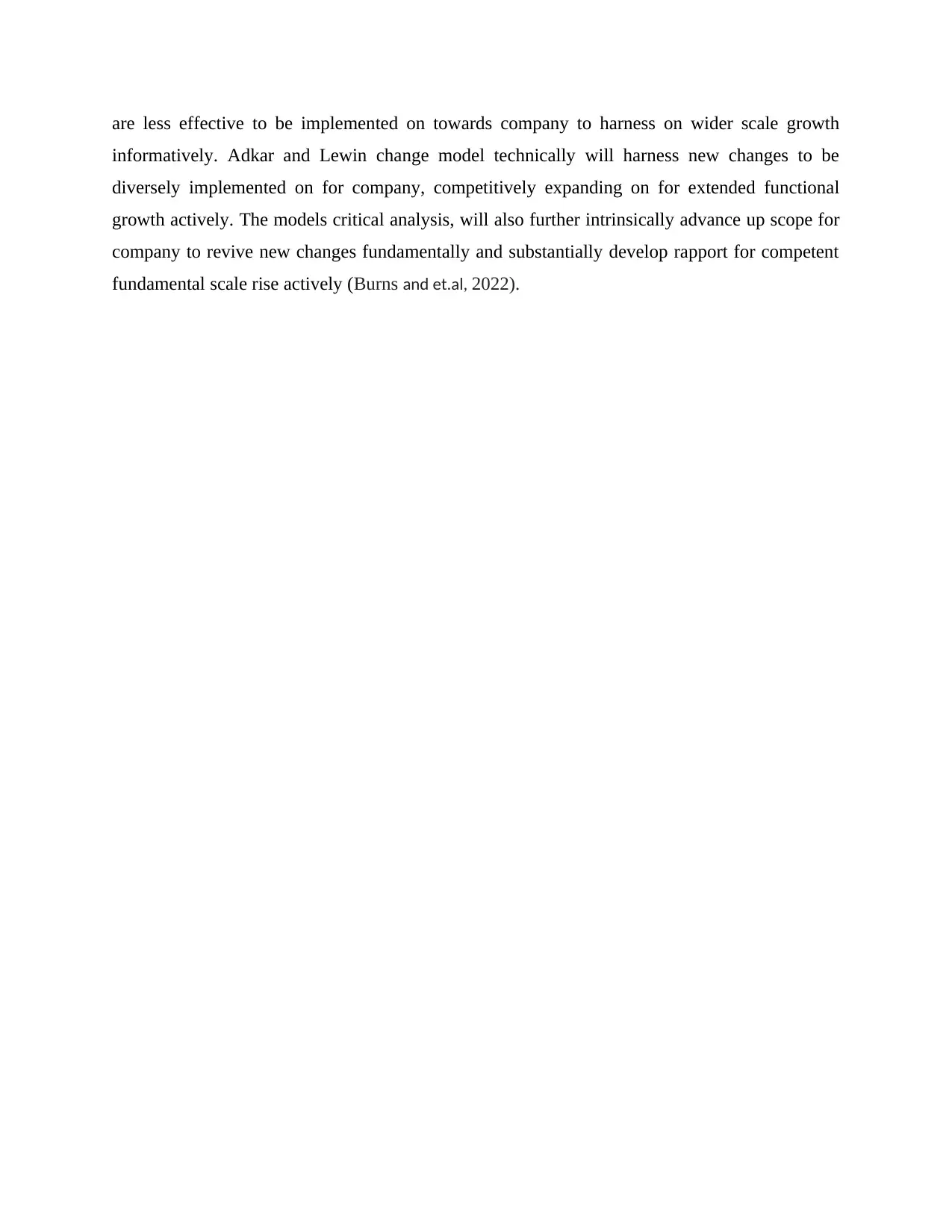
are less effective to be implemented on towards company to harness on wider scale growth
informatively. Adkar and Lewin change model technically will harness new changes to be
diversely implemented on for company, competitively expanding on for extended functional
growth actively. The models critical analysis, will also further intrinsically advance up scope for
company to revive new changes fundamentally and substantially develop rapport for competent
fundamental scale rise actively (Burns and et.al, 2022).
informatively. Adkar and Lewin change model technically will harness new changes to be
diversely implemented on for company, competitively expanding on for extended functional
growth actively. The models critical analysis, will also further intrinsically advance up scope for
company to revive new changes fundamentally and substantially develop rapport for competent
fundamental scale rise actively (Burns and et.al, 2022).
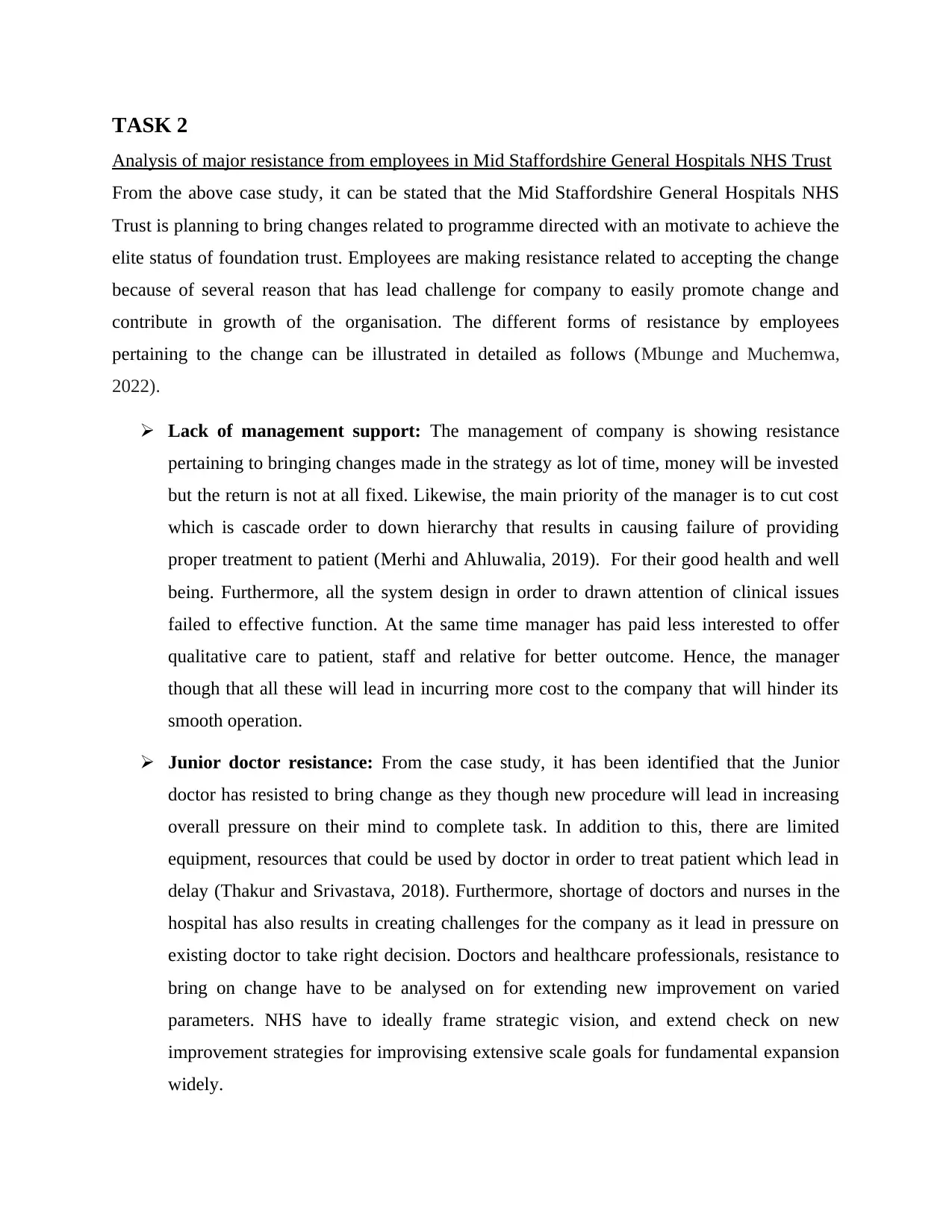
TASK 2
Analysis of major resistance from employees in Mid Staffordshire General Hospitals NHS Trust
From the above case study, it can be stated that the Mid Staffordshire General Hospitals NHS
Trust is planning to bring changes related to programme directed with an motivate to achieve the
elite status of foundation trust. Employees are making resistance related to accepting the change
because of several reason that has lead challenge for company to easily promote change and
contribute in growth of the organisation. The different forms of resistance by employees
pertaining to the change can be illustrated in detailed as follows (Mbunge and Muchemwa,
2022).
Lack of management support: The management of company is showing resistance
pertaining to bringing changes made in the strategy as lot of time, money will be invested
but the return is not at all fixed. Likewise, the main priority of the manager is to cut cost
which is cascade order to down hierarchy that results in causing failure of providing
proper treatment to patient (Merhi and Ahluwalia, 2019). For their good health and well
being. Furthermore, all the system design in order to drawn attention of clinical issues
failed to effective function. At the same time manager has paid less interested to offer
qualitative care to patient, staff and relative for better outcome. Hence, the manager
though that all these will lead in incurring more cost to the company that will hinder its
smooth operation.
Junior doctor resistance: From the case study, it has been identified that the Junior
doctor has resisted to bring change as they though new procedure will lead in increasing
overall pressure on their mind to complete task. In addition to this, there are limited
equipment, resources that could be used by doctor in order to treat patient which lead in
delay (Thakur and Srivastava, 2018). Furthermore, shortage of doctors and nurses in the
hospital has also results in creating challenges for the company as it lead in pressure on
existing doctor to take right decision. Doctors and healthcare professionals, resistance to
bring on change have to be analysed on for extending new improvement on varied
parameters. NHS have to ideally frame strategic vision, and extend check on new
improvement strategies for improvising extensive scale goals for fundamental expansion
widely.
Analysis of major resistance from employees in Mid Staffordshire General Hospitals NHS Trust
From the above case study, it can be stated that the Mid Staffordshire General Hospitals NHS
Trust is planning to bring changes related to programme directed with an motivate to achieve the
elite status of foundation trust. Employees are making resistance related to accepting the change
because of several reason that has lead challenge for company to easily promote change and
contribute in growth of the organisation. The different forms of resistance by employees
pertaining to the change can be illustrated in detailed as follows (Mbunge and Muchemwa,
2022).
Lack of management support: The management of company is showing resistance
pertaining to bringing changes made in the strategy as lot of time, money will be invested
but the return is not at all fixed. Likewise, the main priority of the manager is to cut cost
which is cascade order to down hierarchy that results in causing failure of providing
proper treatment to patient (Merhi and Ahluwalia, 2019). For their good health and well
being. Furthermore, all the system design in order to drawn attention of clinical issues
failed to effective function. At the same time manager has paid less interested to offer
qualitative care to patient, staff and relative for better outcome. Hence, the manager
though that all these will lead in incurring more cost to the company that will hinder its
smooth operation.
Junior doctor resistance: From the case study, it has been identified that the Junior
doctor has resisted to bring change as they though new procedure will lead in increasing
overall pressure on their mind to complete task. In addition to this, there are limited
equipment, resources that could be used by doctor in order to treat patient which lead in
delay (Thakur and Srivastava, 2018). Furthermore, shortage of doctors and nurses in the
hospital has also results in creating challenges for the company as it lead in pressure on
existing doctor to take right decision. Doctors and healthcare professionals, resistance to
bring on change have to be analysed on for extending new improvement on varied
parameters. NHS have to ideally frame strategic vision, and extend check on new
improvement strategies for improvising extensive scale goals for fundamental expansion
widely.
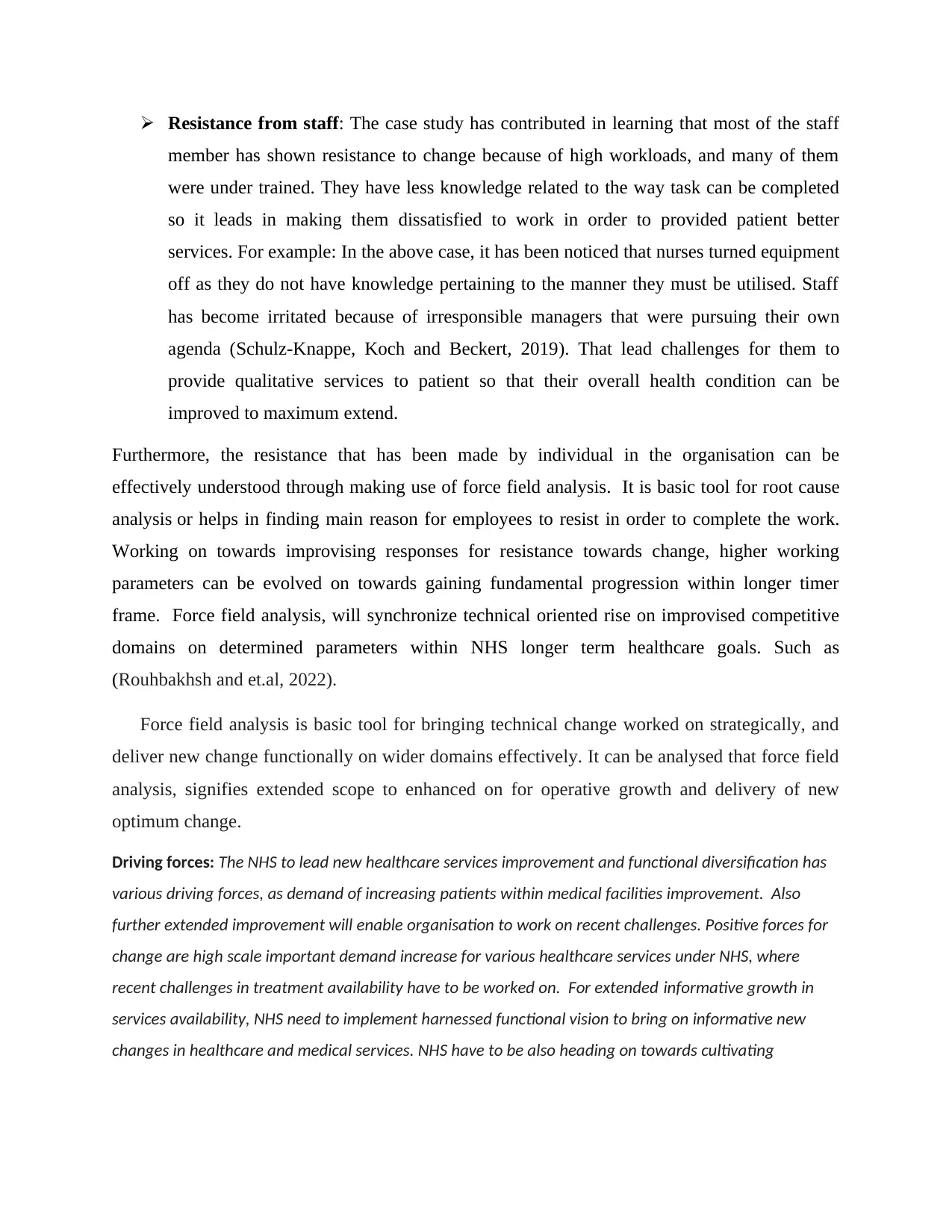
Resistance from staff: The case study has contributed in learning that most of the staff
member has shown resistance to change because of high workloads, and many of them
were under trained. They have less knowledge related to the way task can be completed
so it leads in making them dissatisfied to work in order to provided patient better
services. For example: In the above case, it has been noticed that nurses turned equipment
off as they do not have knowledge pertaining to the manner they must be utilised. Staff
has become irritated because of irresponsible managers that were pursuing their own
agenda (Schulz-Knappe, Koch and Beckert, 2019). That lead challenges for them to
provide qualitative services to patient so that their overall health condition can be
improved to maximum extend.
Furthermore, the resistance that has been made by individual in the organisation can be
effectively understood through making use of force field analysis. It is basic tool for root cause
analysis or helps in finding main reason for employees to resist in order to complete the work.
Working on towards improvising responses for resistance towards change, higher working
parameters can be evolved on towards gaining fundamental progression within longer timer
frame. Force field analysis, will synchronize technical oriented rise on improvised competitive
domains on determined parameters within NHS longer term healthcare goals. Such as
(Rouhbakhsh and et.al, 2022).
Force field analysis is basic tool for bringing technical change worked on strategically, and
deliver new change functionally on wider domains effectively. It can be analysed that force field
analysis, signifies extended scope to enhanced on for operative growth and delivery of new
optimum change.
Driving forces: The NHS to lead new healthcare services improvement and functional diversification has
various driving forces, as demand of increasing patients within medical facilities improvement. Also
further extended improvement will enable organisation to work on recent challenges. Positive forces for
change are high scale important demand increase for various healthcare services under NHS, where
recent challenges in treatment availability have to be worked on. For extended informative growth in
services availability, NHS need to implement harnessed functional vision to bring on informative new
changes in healthcare and medical services. NHS have to be also heading on towards cultivating
member has shown resistance to change because of high workloads, and many of them
were under trained. They have less knowledge related to the way task can be completed
so it leads in making them dissatisfied to work in order to provided patient better
services. For example: In the above case, it has been noticed that nurses turned equipment
off as they do not have knowledge pertaining to the manner they must be utilised. Staff
has become irritated because of irresponsible managers that were pursuing their own
agenda (Schulz-Knappe, Koch and Beckert, 2019). That lead challenges for them to
provide qualitative services to patient so that their overall health condition can be
improved to maximum extend.
Furthermore, the resistance that has been made by individual in the organisation can be
effectively understood through making use of force field analysis. It is basic tool for root cause
analysis or helps in finding main reason for employees to resist in order to complete the work.
Working on towards improvising responses for resistance towards change, higher working
parameters can be evolved on towards gaining fundamental progression within longer timer
frame. Force field analysis, will synchronize technical oriented rise on improvised competitive
domains on determined parameters within NHS longer term healthcare goals. Such as
(Rouhbakhsh and et.al, 2022).
Force field analysis is basic tool for bringing technical change worked on strategically, and
deliver new change functionally on wider domains effectively. It can be analysed that force field
analysis, signifies extended scope to enhanced on for operative growth and delivery of new
optimum change.
Driving forces: The NHS to lead new healthcare services improvement and functional diversification has
various driving forces, as demand of increasing patients within medical facilities improvement. Also
further extended improvement will enable organisation to work on recent challenges. Positive forces for
change are high scale important demand increase for various healthcare services under NHS, where
recent challenges in treatment availability have to be worked on. For extended informative growth in
services availability, NHS need to implement harnessed functional vision to bring on informative new
changes in healthcare and medical services. NHS have to be also heading on towards cultivating
Secure Best Marks with AI Grader
Need help grading? Try our AI Grader for instant feedback on your assignments.
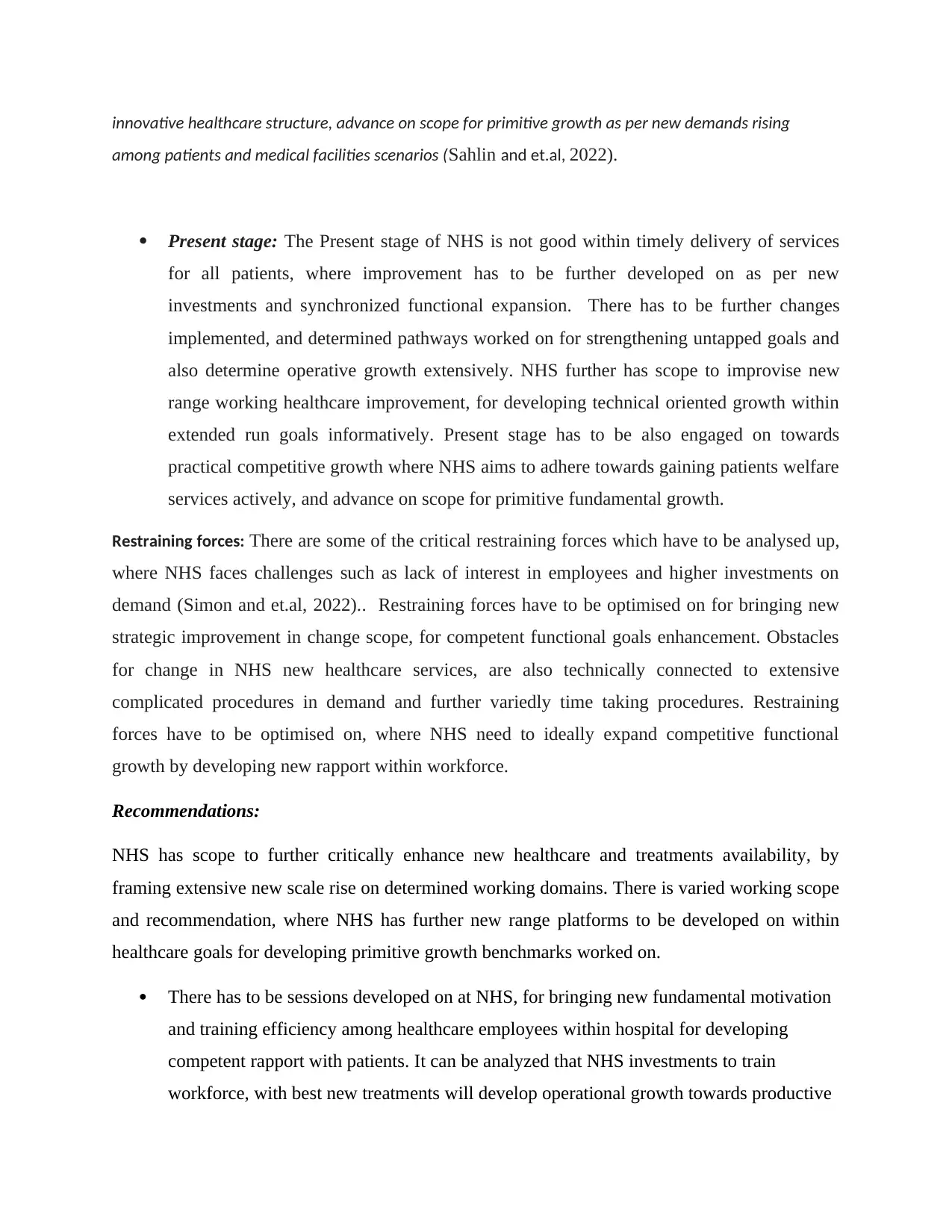
innovative healthcare structure, advance on scope for primitive growth as per new demands rising
among patients and medical facilities scenarios (Sahlin and et.al, 2022).
Present stage: The Present stage of NHS is not good within timely delivery of services
for all patients, where improvement has to be further developed on as per new
investments and synchronized functional expansion. There has to be further changes
implemented, and determined pathways worked on for strengthening untapped goals and
also determine operative growth extensively. NHS further has scope to improvise new
range working healthcare improvement, for developing technical oriented growth within
extended run goals informatively. Present stage has to be also engaged on towards
practical competitive growth where NHS aims to adhere towards gaining patients welfare
services actively, and advance on scope for primitive fundamental growth.
Restraining forces: There are some of the critical restraining forces which have to be analysed up,
where NHS faces challenges such as lack of interest in employees and higher investments on
demand (Simon and et.al, 2022).. Restraining forces have to be optimised on for bringing new
strategic improvement in change scope, for competent functional goals enhancement. Obstacles
for change in NHS new healthcare services, are also technically connected to extensive
complicated procedures in demand and further variedly time taking procedures. Restraining
forces have to be optimised on, where NHS need to ideally expand competitive functional
growth by developing new rapport within workforce.
Recommendations:
NHS has scope to further critically enhance new healthcare and treatments availability, by
framing extensive new scale rise on determined working domains. There is varied working scope
and recommendation, where NHS has further new range platforms to be developed on within
healthcare goals for developing primitive growth benchmarks worked on.
There has to be sessions developed on at NHS, for bringing new fundamental motivation
and training efficiency among healthcare employees within hospital for developing
competent rapport with patients. It can be analyzed that NHS investments to train
workforce, with best new treatments will develop operational growth towards productive
among patients and medical facilities scenarios (Sahlin and et.al, 2022).
Present stage: The Present stage of NHS is not good within timely delivery of services
for all patients, where improvement has to be further developed on as per new
investments and synchronized functional expansion. There has to be further changes
implemented, and determined pathways worked on for strengthening untapped goals and
also determine operative growth extensively. NHS further has scope to improvise new
range working healthcare improvement, for developing technical oriented growth within
extended run goals informatively. Present stage has to be also engaged on towards
practical competitive growth where NHS aims to adhere towards gaining patients welfare
services actively, and advance on scope for primitive fundamental growth.
Restraining forces: There are some of the critical restraining forces which have to be analysed up,
where NHS faces challenges such as lack of interest in employees and higher investments on
demand (Simon and et.al, 2022).. Restraining forces have to be optimised on for bringing new
strategic improvement in change scope, for competent functional goals enhancement. Obstacles
for change in NHS new healthcare services, are also technically connected to extensive
complicated procedures in demand and further variedly time taking procedures. Restraining
forces have to be optimised on, where NHS need to ideally expand competitive functional
growth by developing new rapport within workforce.
Recommendations:
NHS has scope to further critically enhance new healthcare and treatments availability, by
framing extensive new scale rise on determined working domains. There is varied working scope
and recommendation, where NHS has further new range platforms to be developed on within
healthcare goals for developing primitive growth benchmarks worked on.
There has to be sessions developed on at NHS, for bringing new fundamental motivation
and training efficiency among healthcare employees within hospital for developing
competent rapport with patients. It can be analyzed that NHS investments to train
workforce, with best new treatments will develop operational growth towards productive
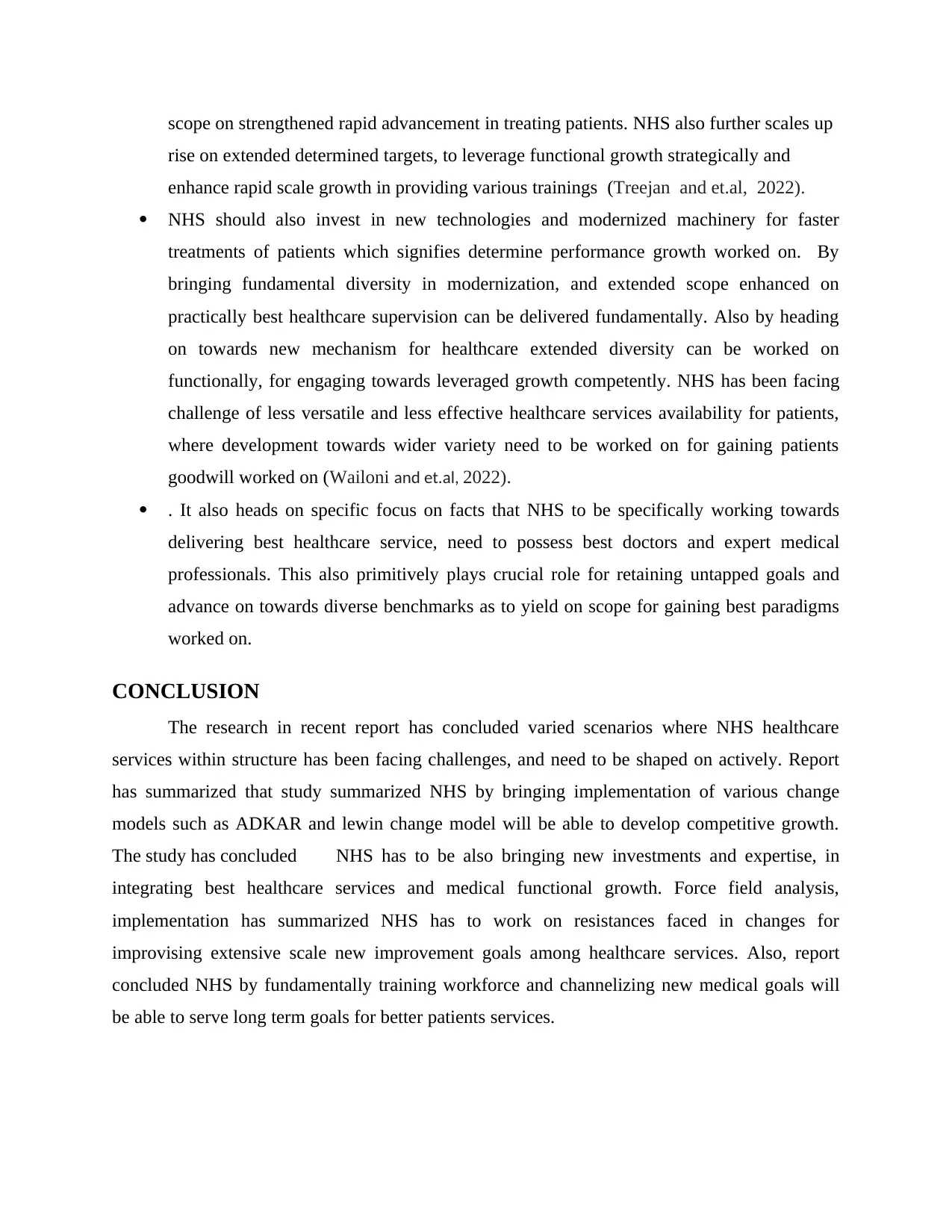
scope on strengthened rapid advancement in treating patients. NHS also further scales up
rise on extended determined targets, to leverage functional growth strategically and
enhance rapid scale growth in providing various trainings (Treejan and et.al, 2022).
NHS should also invest in new technologies and modernized machinery for faster
treatments of patients which signifies determine performance growth worked on. By
bringing fundamental diversity in modernization, and extended scope enhanced on
practically best healthcare supervision can be delivered fundamentally. Also by heading
on towards new mechanism for healthcare extended diversity can be worked on
functionally, for engaging towards leveraged growth competently. NHS has been facing
challenge of less versatile and less effective healthcare services availability for patients,
where development towards wider variety need to be worked on for gaining patients
goodwill worked on (Wailoni and et.al, 2022).
. It also heads on specific focus on facts that NHS to be specifically working towards
delivering best healthcare service, need to possess best doctors and expert medical
professionals. This also primitively plays crucial role for retaining untapped goals and
advance on towards diverse benchmarks as to yield on scope for gaining best paradigms
worked on.
CONCLUSION
The research in recent report has concluded varied scenarios where NHS healthcare
services within structure has been facing challenges, and need to be shaped on actively. Report
has summarized that study summarized NHS by bringing implementation of various change
models such as ADKAR and lewin change model will be able to develop competitive growth.
The study has concluded NHS has to be also bringing new investments and expertise, in
integrating best healthcare services and medical functional growth. Force field analysis,
implementation has summarized NHS has to work on resistances faced in changes for
improvising extensive scale new improvement goals among healthcare services. Also, report
concluded NHS by fundamentally training workforce and channelizing new medical goals will
be able to serve long term goals for better patients services.
rise on extended determined targets, to leverage functional growth strategically and
enhance rapid scale growth in providing various trainings (Treejan and et.al, 2022).
NHS should also invest in new technologies and modernized machinery for faster
treatments of patients which signifies determine performance growth worked on. By
bringing fundamental diversity in modernization, and extended scope enhanced on
practically best healthcare supervision can be delivered fundamentally. Also by heading
on towards new mechanism for healthcare extended diversity can be worked on
functionally, for engaging towards leveraged growth competently. NHS has been facing
challenge of less versatile and less effective healthcare services availability for patients,
where development towards wider variety need to be worked on for gaining patients
goodwill worked on (Wailoni and et.al, 2022).
. It also heads on specific focus on facts that NHS to be specifically working towards
delivering best healthcare service, need to possess best doctors and expert medical
professionals. This also primitively plays crucial role for retaining untapped goals and
advance on towards diverse benchmarks as to yield on scope for gaining best paradigms
worked on.
CONCLUSION
The research in recent report has concluded varied scenarios where NHS healthcare
services within structure has been facing challenges, and need to be shaped on actively. Report
has summarized that study summarized NHS by bringing implementation of various change
models such as ADKAR and lewin change model will be able to develop competitive growth.
The study has concluded NHS has to be also bringing new investments and expertise, in
integrating best healthcare services and medical functional growth. Force field analysis,
implementation has summarized NHS has to work on resistances faced in changes for
improvising extensive scale new improvement goals among healthcare services. Also, report
concluded NHS by fundamentally training workforce and channelizing new medical goals will
be able to serve long term goals for better patients services.
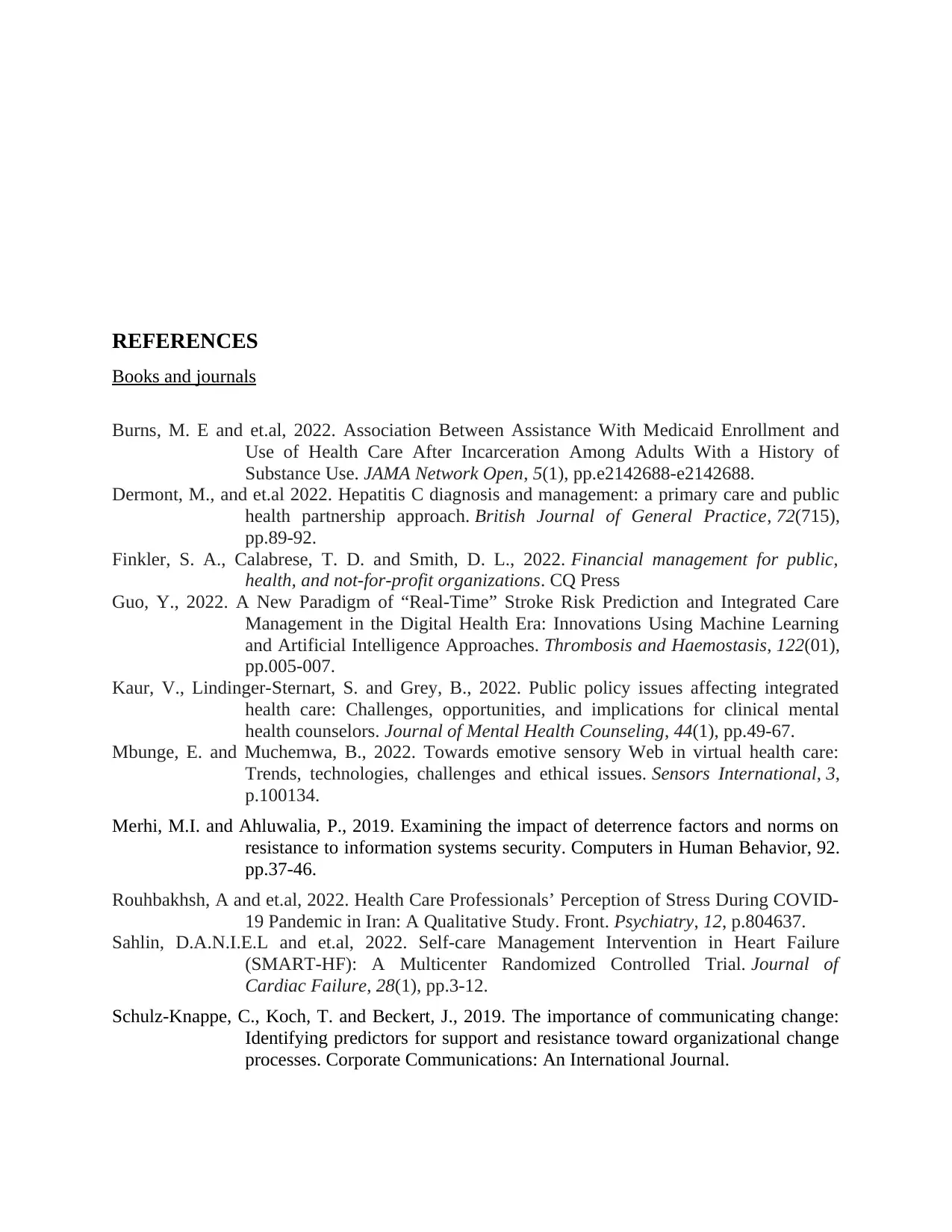
REFERENCES
Books and journals
Burns, M. E and et.al, 2022. Association Between Assistance With Medicaid Enrollment and
Use of Health Care After Incarceration Among Adults With a History of
Substance Use. JAMA Network Open, 5(1), pp.e2142688-e2142688.
Dermont, M., and et.al 2022. Hepatitis C diagnosis and management: a primary care and public
health partnership approach. British Journal of General Practice, 72(715),
pp.89-92.
Finkler, S. A., Calabrese, T. D. and Smith, D. L., 2022. Financial management for public,
health, and not-for-profit organizations. CQ Press
Guo, Y., 2022. A New Paradigm of “Real-Time” Stroke Risk Prediction and Integrated Care
Management in the Digital Health Era: Innovations Using Machine Learning
and Artificial Intelligence Approaches. Thrombosis and Haemostasis, 122(01),
pp.005-007.
Kaur, V., Lindinger-Sternart, S. and Grey, B., 2022. Public policy issues affecting integrated
health care: Challenges, opportunities, and implications for clinical mental
health counselors. Journal of Mental Health Counseling, 44(1), pp.49-67.
Mbunge, E. and Muchemwa, B., 2022. Towards emotive sensory Web in virtual health care:
Trends, technologies, challenges and ethical issues. Sensors International, 3,
p.100134.
Merhi, M.I. and Ahluwalia, P., 2019. Examining the impact of deterrence factors and norms on
resistance to information systems security. Computers in Human Behavior, 92.
pp.37-46.
Rouhbakhsh, A and et.al, 2022. Health Care Professionals’ Perception of Stress During COVID-
19 Pandemic in Iran: A Qualitative Study. Front. Psychiatry, 12, p.804637.
Sahlin, D.A.N.I.E.L and et.al, 2022. Self-care Management Intervention in Heart Failure
(SMART-HF): A Multicenter Randomized Controlled Trial. Journal of
Cardiac Failure, 28(1), pp.3-12.
Schulz-Knappe, C., Koch, T. and Beckert, J., 2019. The importance of communicating change:
Identifying predictors for support and resistance toward organizational change
processes. Corporate Communications: An International Journal.
Books and journals
Burns, M. E and et.al, 2022. Association Between Assistance With Medicaid Enrollment and
Use of Health Care After Incarceration Among Adults With a History of
Substance Use. JAMA Network Open, 5(1), pp.e2142688-e2142688.
Dermont, M., and et.al 2022. Hepatitis C diagnosis and management: a primary care and public
health partnership approach. British Journal of General Practice, 72(715),
pp.89-92.
Finkler, S. A., Calabrese, T. D. and Smith, D. L., 2022. Financial management for public,
health, and not-for-profit organizations. CQ Press
Guo, Y., 2022. A New Paradigm of “Real-Time” Stroke Risk Prediction and Integrated Care
Management in the Digital Health Era: Innovations Using Machine Learning
and Artificial Intelligence Approaches. Thrombosis and Haemostasis, 122(01),
pp.005-007.
Kaur, V., Lindinger-Sternart, S. and Grey, B., 2022. Public policy issues affecting integrated
health care: Challenges, opportunities, and implications for clinical mental
health counselors. Journal of Mental Health Counseling, 44(1), pp.49-67.
Mbunge, E. and Muchemwa, B., 2022. Towards emotive sensory Web in virtual health care:
Trends, technologies, challenges and ethical issues. Sensors International, 3,
p.100134.
Merhi, M.I. and Ahluwalia, P., 2019. Examining the impact of deterrence factors and norms on
resistance to information systems security. Computers in Human Behavior, 92.
pp.37-46.
Rouhbakhsh, A and et.al, 2022. Health Care Professionals’ Perception of Stress During COVID-
19 Pandemic in Iran: A Qualitative Study. Front. Psychiatry, 12, p.804637.
Sahlin, D.A.N.I.E.L and et.al, 2022. Self-care Management Intervention in Heart Failure
(SMART-HF): A Multicenter Randomized Controlled Trial. Journal of
Cardiac Failure, 28(1), pp.3-12.
Schulz-Knappe, C., Koch, T. and Beckert, J., 2019. The importance of communicating change:
Identifying predictors for support and resistance toward organizational change
processes. Corporate Communications: An International Journal.
Paraphrase This Document
Need a fresh take? Get an instant paraphrase of this document with our AI Paraphraser
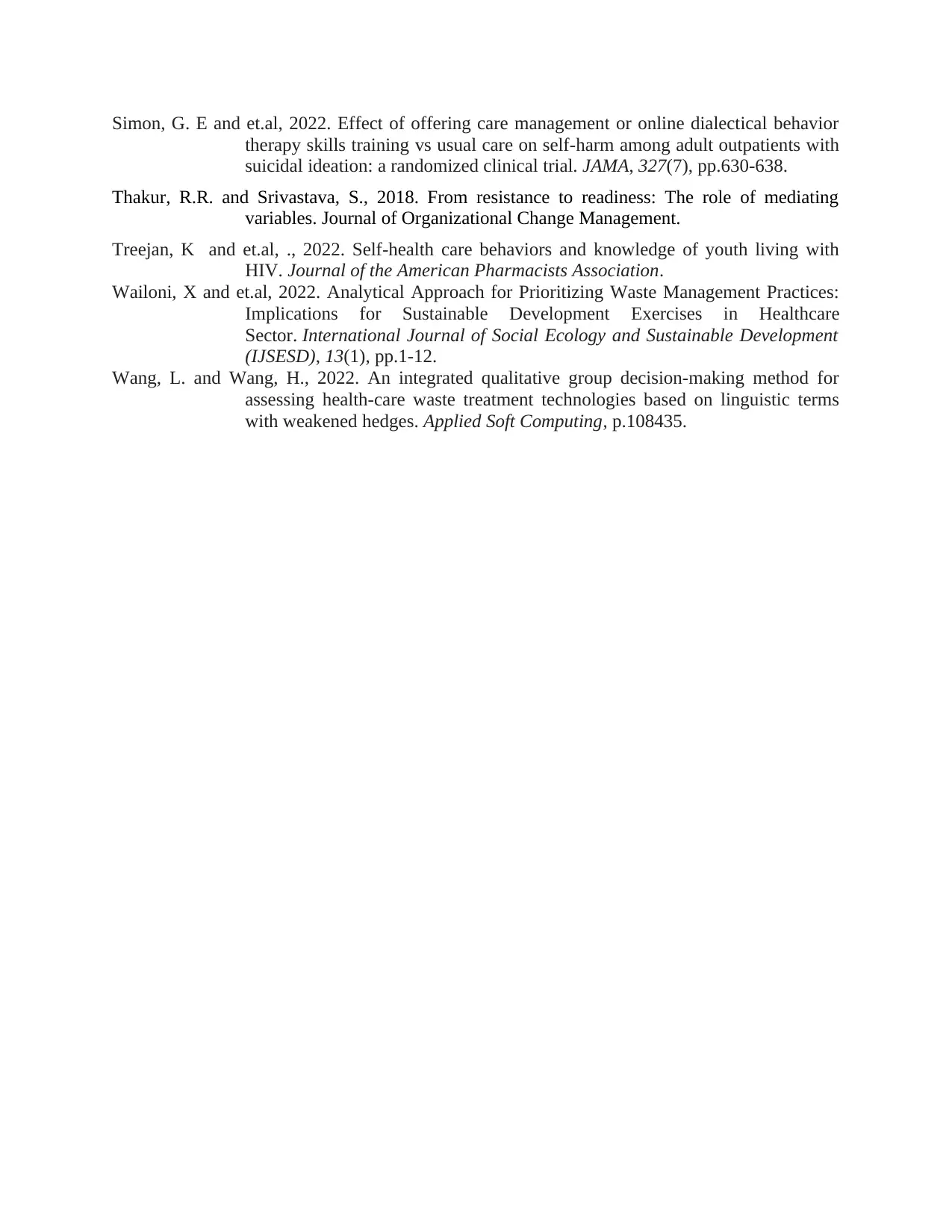
Simon, G. E and et.al, 2022. Effect of offering care management or online dialectical behavior
therapy skills training vs usual care on self-harm among adult outpatients with
suicidal ideation: a randomized clinical trial. JAMA, 327(7), pp.630-638.
Thakur, R.R. and Srivastava, S., 2018. From resistance to readiness: The role of mediating
variables. Journal of Organizational Change Management.
Treejan, K and et.al, ., 2022. Self-health care behaviors and knowledge of youth living with
HIV. Journal of the American Pharmacists Association.
Wailoni, X and et.al, 2022. Analytical Approach for Prioritizing Waste Management Practices:
Implications for Sustainable Development Exercises in Healthcare
Sector. International Journal of Social Ecology and Sustainable Development
(IJSESD), 13(1), pp.1-12.
Wang, L. and Wang, H., 2022. An integrated qualitative group decision-making method for
assessing health-care waste treatment technologies based on linguistic terms
with weakened hedges. Applied Soft Computing, p.108435.
therapy skills training vs usual care on self-harm among adult outpatients with
suicidal ideation: a randomized clinical trial. JAMA, 327(7), pp.630-638.
Thakur, R.R. and Srivastava, S., 2018. From resistance to readiness: The role of mediating
variables. Journal of Organizational Change Management.
Treejan, K and et.al, ., 2022. Self-health care behaviors and knowledge of youth living with
HIV. Journal of the American Pharmacists Association.
Wailoni, X and et.al, 2022. Analytical Approach for Prioritizing Waste Management Practices:
Implications for Sustainable Development Exercises in Healthcare
Sector. International Journal of Social Ecology and Sustainable Development
(IJSESD), 13(1), pp.1-12.
Wang, L. and Wang, H., 2022. An integrated qualitative group decision-making method for
assessing health-care waste treatment technologies based on linguistic terms
with weakened hedges. Applied Soft Computing, p.108435.
1 out of 14
Related Documents
Your All-in-One AI-Powered Toolkit for Academic Success.
+13062052269
info@desklib.com
Available 24*7 on WhatsApp / Email
![[object Object]](/_next/static/media/star-bottom.7253800d.svg)
Unlock your academic potential
© 2024 | Zucol Services PVT LTD | All rights reserved.





